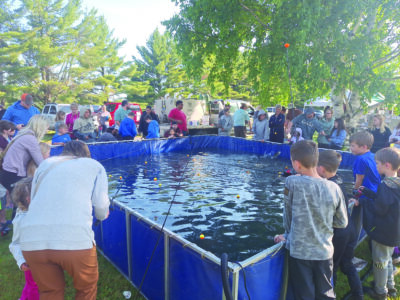MTU launches COVID-19 testing

Photo provided by Caryn Heldt/Michigan Tech Michigan Technological University’s lab began testing samples from local health care providers for COVID-19 this week. The lab could reduce the wait for results, which had been as much as two weeks, to the same or next day.
HOUGHTON — Local health care providers trying to get test results for patients who may have COVID-19 have often had to wait up to two weeks to get results back.
Through a lab at Michigan Technological University, the long wait will be a thing of the past.
In a partnership with local hospitals, MTU has set up a facility that will be able to provide same-day or next-day results. Thursday was its first day accepting patient samples.
State Rep. Greg Markkanen and Sen. Ed McBroom helped initiate the lab, and pushed for it to be in the Upper Peninsula. Researchers worked for three weeks setting up the lab and making sure it could produce accurate test results, said Claire Danielson, medical laboratory science clinical practicum coordinator at Michigan Tech, who helped set up the lab.
“How fast it all came together is pretty unbelievable,” she said. “It was an excellent team that put this together and put wouldn’t have been possible without everybody working together.”
The lab went through a validation study from the state, and also had to make sure it had protocols in place for receiving and processing samples.
“Even something as small as receiving it, it takes a lot to make sure we have everything in order before we’re running samples,” Danielson said.
The lab has two analyzers that can run 40 samples per hour, Danielson said. So far, the samples are coming from local hospitals — UP Health System, Aspirus and Baraga County Memorial Hospital — and the clinic at MTU. At least at the start, Danielson does not anticipate receiving more than 20 or 30 samples a day.
“We’re starting out fairly small so we can make sure we have our procedures in place and everything is running smoothly,” she said.
The lab has a two-step method. First, researchers extract the RNA from the bodily material collected from a nasal swab. That genetic sample is then run through a polymerase chain reaction (PCR), which rapidly produces copies, making it easier to detect any virus present.
The two procedures are done in separate rooms to ensure there is no cross-contamination, Danielson said.
For RNA extraction, the team uses a Biosafety Level 2 lab (out of a possible four levels); the higher the number, the greater the precautions. Personnel wear lab coats, gloves, safety gloves and a mask at all times. All work is done under biosafety hoods, which are vented so people are not directly exposed to any of the sample.
As a further step, people must put personal protection equipment on before entering, and remove it before they leave. They must also wash their hands well, Danielson said.
The PCR room is a Biosafety level 1 lab, which requires less stringent protections, though personnel still wear PPE.
“The RNA has already been extracted from the virus, so you should not be able to contract it,” Danielson said.
The team is being led by Cary Gottlieb, pathologist from OSF St. Francis Hospital in Escanaba. The initial 14-person team combines expertise from several areas of study, including virology, vaccine development, wildlife genetics and biomedical engineering.
“The staffing is changing, and we’re training more people to be able to handle a large volume in case that does happen,” Danielson said.
Precedence is going to the top two tiers in the three-level priority list: Priority 1, such as health-care workers showing symptoms; and Priority 2, which includes symptomatic people living in group settings such as nursing homes.
How long the lab operates will depend on how long things are closed down and how long the need exists, as well as the availability of chemical reagents for the test, Danielson said. She doesn’t anticipate it closing anytime soon.
“I know that it’s a struggle for a lot of smaller facilities in the U.P. as a whole to get the reagents and have the capacity to run these tests,” she said. “It’s a really great thing Michigan Tech is doing to get these results a lot quicker.”





